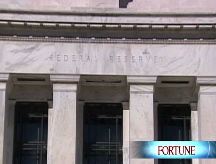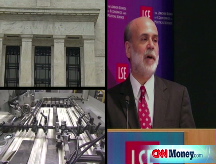Regulators: We need the second half of TARP
Fed's Kohn and top official at the FDIC tell Congress the remaining $350 billion for the bank bailout should be released; offer suggestions on how to spend the funds.
NEW YORK (CNNMoney.com) -- Federal regulators urged Congress Tuesday to release the $350 billion in remaining bank bailout money, even as they lobbied for a different approach to spending the remaining funds.
Testifying before the House Financial Services committee, Federal Reserve vice chairman Donald Kohn and John Bovenzi, the chief operating officer of the Federal Deposit Insurance Corporation, told lawmakers that the second half of the $700 billion so-called Troubled Asset Relief Program, or TARP, will be necessary to prevent the U.S. economy and financial system from deteriorating any further.
"The remaining TARP funds will play an essential role in further strengthening the financial system and restoring normal credit flows," Kohn said in his prepared remarks.
The bulk of the first installment of TARP money has gone towards propping such ailing financial institutions as Citigroup (C, Fortune 500) and AIG (AIG, Fortune 500).
As of last week, the Treasury Department, which has been charged with allocating the funds, has invested $187.5 billion in 215 banks. Agency officials invested directly in banks starting in October in an effort to help stabilize the financial system and encourage banks to lend more freely.
Banks, however, have come under heavy criticism for failing to use the proceeds from the government on loans to consumers and businesses. Instead, some recipients of the TARP funds have used the money to plug holes in their balance sheet or make acquisitions.
As a result, there has been an increasing call for incoming Treasury Secretary Timothy Geithner to take a different approach when spending the remaining TARP funds.
President-elect Barack Obama asked President Bush Monday to request that Congress free up the remaining $350 billion, even as members of his team stressed to party leaders the need to act quickly.
"President-elect Obama believes it is not too late to change course, but it will be if we don't take dramatic action as soon as possible," Lawrence Summers, Obama director-designate of the National Economic Council, wrote in a letter to Senate and House leadership.
Obama met with Senate leaders earlier Tuesday to discuss TARP, and indicated that while he did not want to request the second half of the bailout package, he insisted he had no choice.
After President Bush formally requested the funds Monday, Congress will now have 15 days to block the request before Treasury can start tapping the funds.
Congressional Democrats have said that part of the TARP funds need to be spent towards homeowners facing foreclosure. House Financial Services Chairman Barney Frank, D-Mass, who proposed legislation that would allocate $50 billion towards that very problem last week, reiterated the need to help homeowners during Tuesday's hearing.
"If we do not get the second $350 billion, I do not see any way we can get substantial foreclosure relief," Frank said.
Bovenzi and Kohn both told Congress they supported plans to help stem the rising tide of foreclosures. They also said the Treasury Department may want to revisit the original intent of the TARP program - buying troubled assets from banks and financial institutions.
Both men believed that strategy could help lure more capital from private investors, which have been conspicuously absent as the crisis has worsened.
"The development of a program to assist institutions in addressing their inventories of troubled assets should be a key component of TARP funds going forward," said Bovenzi, who recently ran the failed lender IndyMac after it was placed into receivership by regulators.
Federal Reserve chairman Ben Bernanke also said in a speech in London Tuesday that buying troubled assets might make sense as a supplement to direct investments.
Other witnesses set to appear at Tuesday's hearing are expected to clamor for investments in some of the nation's smallest banks, many of which still do not have access to TARP funds.
Edward Yingling, the president and CEO of the American Bankers Association, who is also set to testify at Tuesday afternoon's hearing, said in prepared remarks that making those funds available for the more than 3,000 mutual savings banks and S-corporation banks who are now shut out of TARP will further efforts to get credit flowing again.
Also due to testify at the hearing Tuesday are representatives of some housing groups, including the National Community Reinvestment Coalition and National Association of Realtors.
-CNN's Dana Bash contributed to this report
How do you think Barack Obama's presidency will affect you and your wallet? What can he do to help you - and others - in these trying economic times? E-mail us at realstories@cnnmoney.com, and your thoughts could be part of an upcoming story. ![]()



